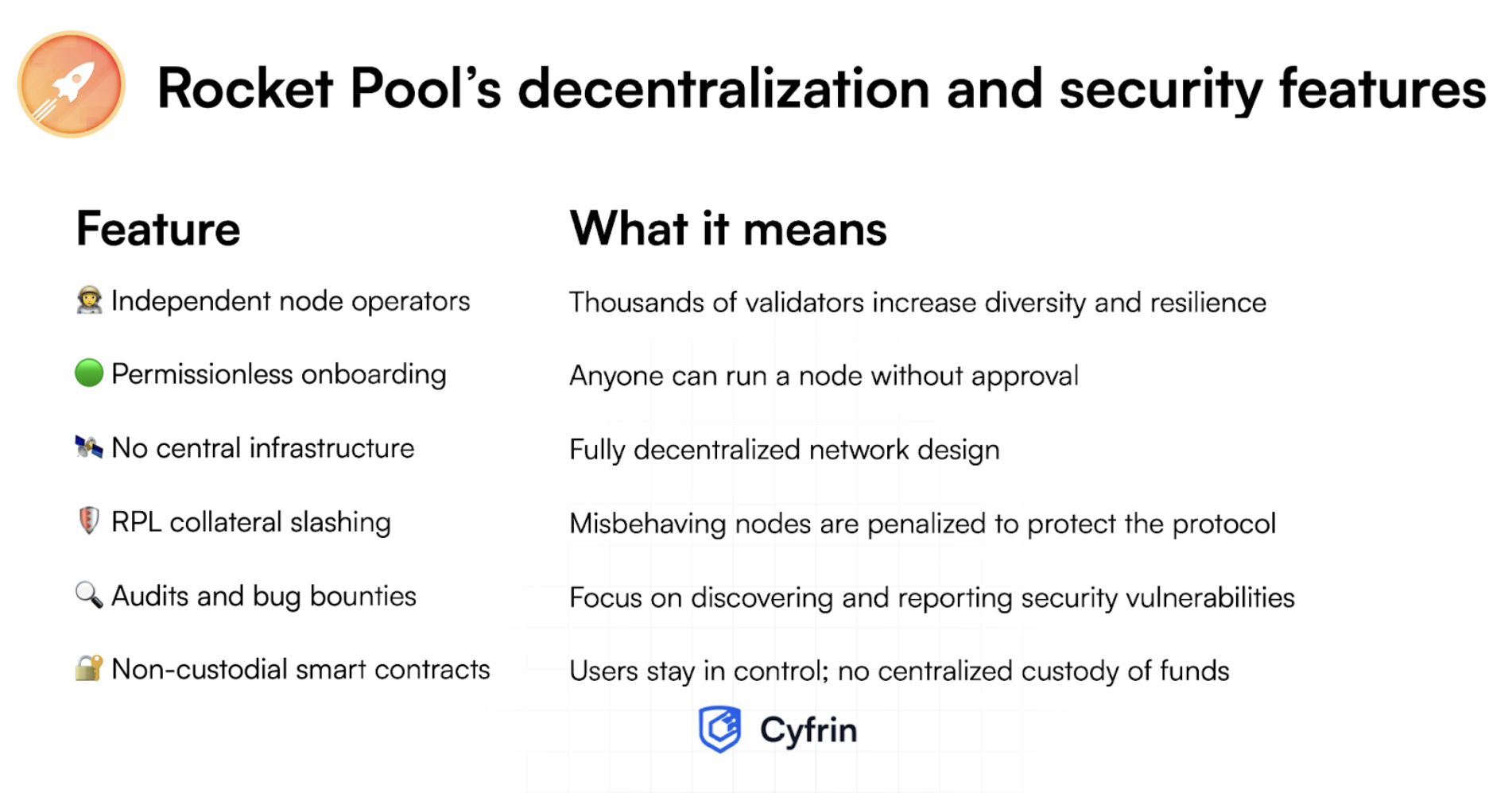Rocket Pool is a decentralized liquid staking protocol for the Ethereum ecosystem that allows anyone to stake ETH, earn staking rewards, and contribute to securing the network without needing to run a solo validator. Built on smart contracts and powered by a global network of independent node operators, Rocket Pool lowers the staking requirements for everyday users and technically inclined node operators.
Rocket Pool solves one of the biggest pain points in Ethereum staking: accessibility. Traditionally, native Ethereum staking demands a full 32 ETH, uptime guarantees, and hardware management. Rocket Pool replaces these with a permissionless staking pool and liquid staking tokens. This approach makes it one of the most used and resilient staking platforms in the ecosystem.
Rocket Pool operates a two-sided marketplace.
The table below compares the two primary participants in the Rocket Pool network, ETH holders and node operators, along key requirements and reward dynamics.
The Rocket Pool network relies on a set of trust-minimized smart contracts that handle deposits, validator assignments, reward tracking, and token minting.
To support off-chain data needs, Rocket Pool uses an Oracle DAO: a decentralized set of elected node operators who submit validator performance data, ensure execution-layer coordination, and monitor for slashing events.
Together, these tools help keep the network secure and ensure that rETH accurately reflects the value of the ETH it represents, including staking rewards.
One of Rocket Pool’s most important innovations is the issuance of rETH, a liquid staking token backed by ETH staked through the protocol. rETH makes staking ETH accessible and flexible by removing the traditional lock-up period and enabling decentralized finance (DeFi) utility.
Benefits of rETH include:
When ETH is deposited, rETH is minted at a rate based on the current value of staked ETH within the Rocket Pool network. As validators perform duties and earn rewards, they are distributed proportionally to stakers. Instead of increasing token balances, rETH reflects accrued rewards through a rising exchange rate against ETH, allowing holders to passively earn staking rewards without manual claims.
rETH integrates with major DeFi protocols and infrastructure providers, including major lending platforms like Aave and Compound, decentralized exchanges (DEXs) such as Uniswap and Curve, and oracle providers like Chainlink.
For users with more capital and technical expertise, Rocket Pool offers the opportunity to become a node operator and run a Rocket Pool node.
Staking requirements for node operators:
Node operators bond their ETH and are matched with 16 or24 ETH (from the pooled deposits of rETH holders) to create full 32 ETH (8 + 24 = 32 or 16 + 16 = 32) validators. These validators operate on the Beacon Chain, the core of Ethereum’s Proof of Stake (PoS) consensus mechanism, which now manages all validator activity since merging with the execution layer in 2022.
Node operators earn:
Node operators use Rocket Pool’s Smartnode stack, which includes Ethereum clients, monitoring tools, and automation for validator setup. This simplifies the technical workload and helps maintain the network's security.
Example rewards
* Bonding 16 ETH results in lower yield because you earn commission on a smaller matched pool (16 ETH vs 24 ETH), making 8 ETH nodes more capital-efficient for the same validator rewards.
The RPL token powers governance and insurance within Rocket Pool. Node operators are required to stake (bond) RPL as collateral when launching a validator. This bonded RPL helps protect the protocol against operator misbehavior.
Key facts about RPL:
RPL also grants token holders voting power in Rocket Pool’s governance system, allowing them to vote on upgrades, parameters, and new features.
Rocket Pool’s decentralized design features:
The protocol’s risk controls include:

These features make Rocket Pool a resilient and trust-minimized staking solution for the Ethereum ecosystem.
Rocket Pool has made rapid progress in decentralization, efficiency, and usability. Key milestones include:
Staking ETH via Rocket Pool is easy and non-custodial. You can use popular wallets like MetaMask or Ledger Live:
Your rETH will appear in your wallet and will automatically accrue value over time.
Rocket Pool proves that decentralization and convenience can coexist. By splitting the hefty 32 ETH bond required to stake ETH, issuing liquid staking tokens, and letting thousands of independent node operators take part, it makes Ethereum staking accessible while keeping the Rocket Pool network robust against single-point failures.
Whether you drop 0.01 ETH for passive income or spin up a smart node to maximize yield, Rocket Pool gives you a decentralized, user-friendly way to participate in Ethereum’s Proof of Stake, with no custodians, no long lockups, and no giant bankroll required.







